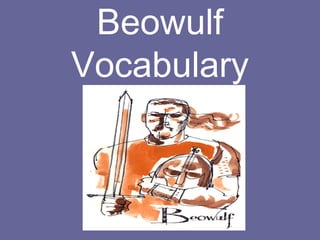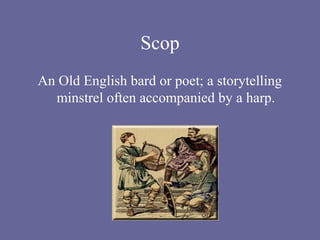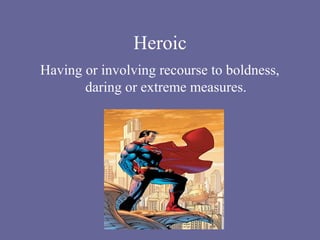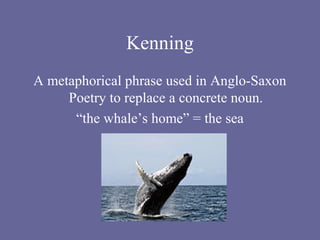Beowulf vocabulary
- 2. Solace Comfort in sorrow, misfortune, or trouble; alleviation of distress or discomfort
- 3. Mead An alcoholic liquor made by fermenting honey and water.
- 4. Mail Flexible armor of interlinked rings. Any flexible armor or covering, as one having a protective exterior of scales or small plates.
- 5. Affliction A state of pain, distress, or grief; misery OUCH!
- 6. Banner A flag formerly used as the standard of a sovereign, lord, or knight
- 7. Fetters A chain or shackle placed on the feet.
- 9. Venerable Commanding respect because of great age or impressive dignity.
- 10. Scop An Old English bard or poet; a storytelling minstrel often accompanied by a harp.
- 11. Druid âĒ A member of a pre-Christian religious order among the ancient Celts or Gaul, Britain, and Ireland.
- 12. Elegiac Expressing sorrow or lamentation.
- 13. Heroic Having or involving recourse to boldness, daring or extreme measures.
- 14. Epic Noting or pertaining to a long poetic composition, usually centered upon a hero, in which a series of great achievements or events is narrated in elevated style
- 15. Kenning A metaphorical phrase used in Anglo-Saxon Poetry to replace a concrete noun. âthe whaleâs homeâ = the sea
- 16. Caesure/Caesurea A break, usually near the middle of a verse, and marked in scansion by a double vertical line, as in know then thyself || presume not God to scan.
- 17. Wyrd A concept in Old English and Old Norse culture roughly corresponding to fate or karma. Fate personified
- 18. Pagan A person who is not a Christian, Jew, or Muslim; an irreligious or hedonistic person


















